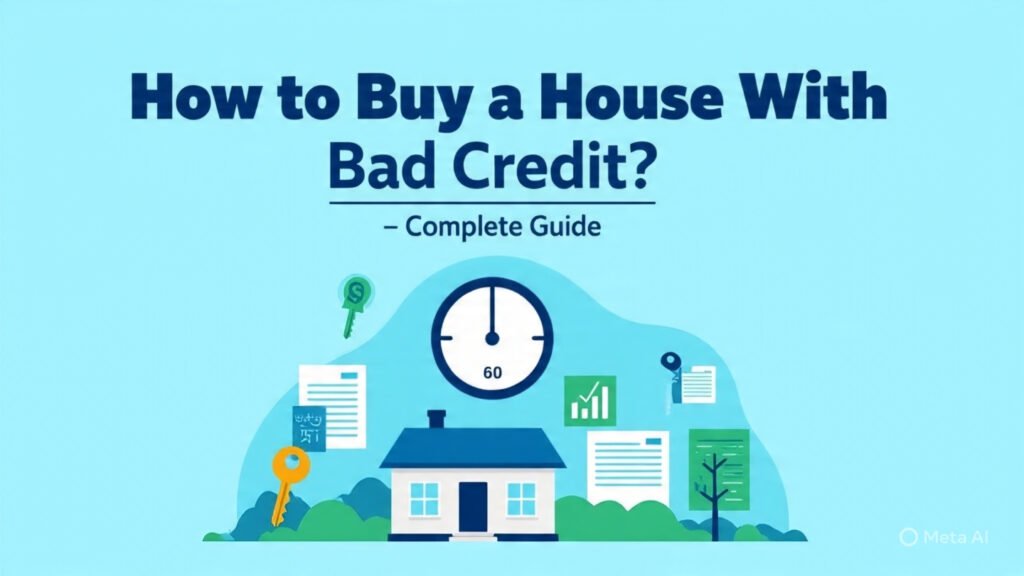Introduction
Buying a home is a dream for many people, but if you have bad credit, it can feel almost impossible. The good news is that you can buy a house with bad credit—you just need the right knowledge, preparation, and resources. This guide explains the best strategies, loan options, and credit improvement tips to help you successfully purchase a home even with a low credit score.

What Is Considered Bad Credit for Home Buying?
Before we dive into solutions, let’s define what bad credit means in real estate.
- A credit score below 580 is generally considered poor by most lenders.
- A fair credit score (580–669) may still qualify you for certain mortgage programs.
- A good score (670+) usually makes the home-buying process easier.
👉 Even with credit scores under 600, there are mortgage loan programs designed to help you become a homeowner.
Can You Buy a House With Bad Credit?
Yes, absolutely. Many buyers with bad credit are still able to purchase homes. However, you’ll need to:
- Understand your credit situation
- Choose the right type of mortgage
- Save for a down payment
- Work with lenders who accept lower credit scores
Loan Options for Buying a House With Bad Credit
Different mortgage programs have different credit score requirements. Here are the most common ones:
1. FHA Loans (Best for Bad Credit)
- Backed by the Federal Housing Administration
- Requires a minimum credit score of 500–580
- Down payment as low as 3.5%
- Popular option for first-time homebuyers with poor credit
2. VA Loans
- For veterans, active military, and eligible spouses
- No down payment required
- Flexible credit requirements
- One of the best options if you qualify
3. USDA Loans
- For buyers in rural and suburban areas
- No down payment required
- Credit score requirements more flexible than conventional loans
4. Conventional Loans
- Usually require 620+ credit score
- Higher down payments may offset low credit
- Private mortgage insurance (PMI) may apply
How to Improve Your Chances of Buying With Bad Credit
If you’re serious about homeownership, here are proven strategies to improve your approval odds:
1. Save a Larger Down Payment
- The more money you put down, the less risk for lenders.
- Aim for at least 10–20% down if possible.
2. Reduce Existing Debt
- Lower your debt-to-income ratio (DTI) before applying.
- Pay off high-interest credit cards first.
3. Find a Co-Signer
- A co-signer with good credit can help you qualify.
- Must be someone willing to share financial responsibility.
4. Shop Around With Multiple Lenders
- Some lenders specialize in bad credit mortgages.
- Compare interest rates, terms, and approval conditions.
5. Consider Rent-to-Own Homes
- Allows you to rent while building credit.
- Part of rent goes toward the purchase price.
Steps to Buy a House With Bad Credit – Checklist
Here’s a simple step-by-step guide:
- Check your credit score & report
- Set a realistic home budget
- Save for a down payment
- Explore FHA, VA, or USDA loans
- Get pre-approved by multiple lenders
- Work with an experienced real estate agent
- Be prepared for higher interest rates
- Negotiate closing costs
- Plan for future refinancing
- Close the deal and move into your home
Common Mistakes to Avoid
- Applying for too many credit cards before mortgage approval
- Ignoring your credit report errors
- Choosing a loan without comparing rates
- Overestimating how much house you can afford
- Not saving enough for emergency expenses after purchase
Expert Tips to Boost Credit Before Buying a House
- Pay all bills on time (payment history = 35% of credit score)
- Keep credit utilization under 30%
- Avoid closing old accounts (credit history length matters)
- Dispute any errors on your credit report
- Consider using a secured credit card to rebuild credit
FAQs – Buying a Home With Bad Credit
Q1: Can I buy a house with a 500 credit score?
👉 Yes, through an FHA loan with at least a 10% down payment.
Q2: What is the easiest loan to get with bad credit?
👉 FHA loans are the most common and flexible for low credit buyers.
Q3: Can I buy a house without a down payment with bad credit?
👉 Yes, if you qualify for VA or USDA loans, which allow zero down.
Q4: Should I wait to improve my credit before buying?
👉 If possible, yes. A higher score saves you thousands in interest. But if housing prices are rising quickly, it may still be worth buying now.
Conclusion
Buying a house with bad credit is challenging but not impossible. By exploring the right loan options, improving your financial profile, and working with lenders who understand your situation, you can achieve homeownership even with a low credit score. Also, read about First-Time Home-buyer Tips: A Complete Guide for Beginners.
Remember: Always consult a licensed real estate advisor or mortgage professional for the most accurate guidance tailored to your circumstances.